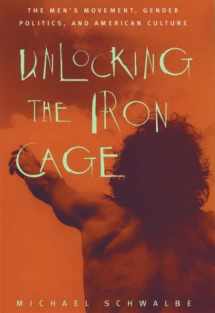
Unlocking the Iron Cage: The Men's Movement, Gender Politics, and American Culture
ISBN-13:
9780195092295
ISBN-10:
0195092295
Edition:
First Edition
Author:
Michael Schwalbe
Publication date:
1996
Publisher:
Oxford University Press
Format:
Hardcover
304 pages
FREE US shipping
Book details
ISBN-13:
9780195092295
ISBN-10:
0195092295
Edition:
First Edition
Author:
Michael Schwalbe
Publication date:
1996
Publisher:
Oxford University Press
Format:
Hardcover
304 pages
Summary
Unlocking the Iron Cage: The Men's Movement, Gender Politics, and American Culture (ISBN-13: 9780195092295 and ISBN-10: 0195092295), written by authors
Michael Schwalbe, was published by Oxford University Press in 1996.
With an overall rating of 4.2 stars, it's a notable title among other
books. You can easily purchase or rent Unlocking the Iron Cage: The Men's Movement, Gender Politics, and American Culture (Hardcover) from BooksRun,
along with many other new and used
books
and textbooks.
And, if you're looking to sell your copy, our current buyback offer is $0.46.
Description
The mythopoetic men's movement grew quietly for ten years before Roberts Bly's bestseller Iron John brought the movement to national attention. Reactions to the movement ranged from bemused or dismissive stories appearing in Sunday supplements and magazines, to outrageous lampoons on stage, to harsh criticism by many feminists. Bly and the mythopoetic claimed in turn to be misunderstood. What is the truth about these men and their movement? Why do these middle-class white men gather at rustic camps to beat drums, dance wildly, hold sweat lodge rituals, laugh and cry, and listen to old myths and fairy tales? Based on Michael Schwalbe's three years of experience as a participant and observer at over one hundred meetings, as well as on interviews with active members, Unlocking the Iron Cage provides a revealing look at who these men are, what they do, why mythopoetic activity appeals to them, what needs it fills, where it succeeds, and where it fails. Schwalbe illuminates the theory behind the mythopoetic movement--which derives largely from Jungian psychology and the archetypal psychology of James Hillman--but for the most part he focuses on the rank-and-file participants. He finds mostly middle-class men trying to cope with the legacy of fathers who gave little emotional sustenance and with a competitive society they find unsatisfying, who sympathize with many of women's complaints about men and sexism (though Schwalbe also finds that many joined as a reaction to what they saw as feminism's blanket indictment of men), and who are searching for an alternative to the traditional image of a man as rational, tough, ambitious, and in control. Schwalbe finds much of value in the men's quest. For instance, he highlights the religious appeal of mythopoetic activity, with its emphasis on finding one's personal truth, its gentle pantheism, its use of ritual to create emotional communion--all of which give the men the wide, inclusive path to spirituality they want. And he shows how Jungian psychology helps the men to redefine their feminine traits, especially their emotionality, as aspects of "deep masculinity." But he also levels some criticisms. He shows, for example, that the myths the men embrace--myths that tend to be devoid of women, or that portray women as beautiful prizes, or as hags, or cloying mothers-- reinforce the presumptions of male superiority they claim to reject. If the mythopoetic movement seems absurd to an outsiders, it is no more ludicrous than football--with fans shirtless in freezing weather, their faces painted, screaming themselves hoarse--and it is far less damaging to men's image of women or of themselves. In Unlocking the Iron Cage, Michael Schwalbe provides an understanding, insightful account of this often-maligned grass-roots movement, revealing both its potential for harm and the genuine value it has for many people.


We would LOVE it if you could help us and other readers by reviewing the book
Book review

Congratulations! We have received your book review.
{user}
{createdAt}
by {truncated_author}


